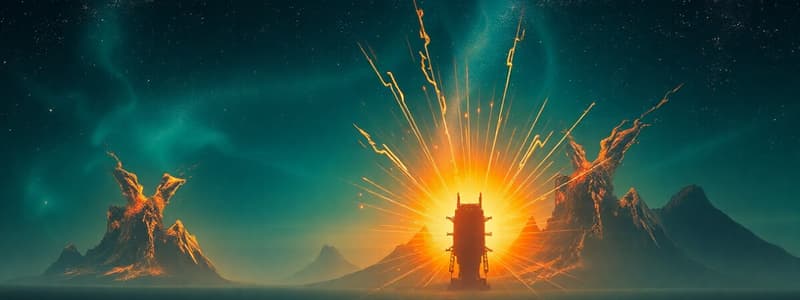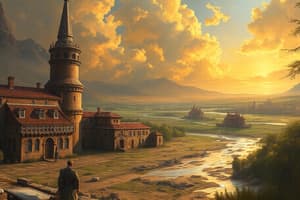Podcast
Questions and Answers
What does the statement about experiencing a different world imply about time and reality in the story?
What does the statement about experiencing a different world imply about time and reality in the story?
It suggests that the characters exist simultaneously in multiple realities without actually traveling through time, emphasizing the fluidity of experience.
How does Rajendra’s accident relate to the concept of catastrophic experience?
How does Rajendra’s accident relate to the concept of catastrophic experience?
Rajendra's accident serves as a catalyst for his experience in an alternate world, linking his unconscious state to a significant theoretical exploration of catastrophe.
In what way does Gangadharpant Gaitonde's comparison of different realities highlight his perspective on history?
In what way does Gangadharpant Gaitonde's comparison of different realities highlight his perspective on history?
His comparisons reveal his preference for a reality where the Marathas triumphed, illustrating a desire for national pride and self-respect.
Explain the term 'lack of determinism' in the context of quantum theory as described in the narrative.
Explain the term 'lack of determinism' in the context of quantum theory as described in the narrative.
What role does Professor Gaitonde's thought process concerning catastrophe theory play in his transition experience?
What role does Professor Gaitonde's thought process concerning catastrophe theory play in his transition experience?
How does the narrative use the concept of an alternate world to explore themes of freedom and identity?
How does the narrative use the concept of an alternate world to explore themes of freedom and identity?
Discuss the significance of interaction in causing a transition as mentioned in the story.
Discuss the significance of interaction in causing a transition as mentioned in the story.
In what way does the exploration of alternate realities challenge traditional notions of historical determinism?
In what way does the exploration of alternate realities challenge traditional notions of historical determinism?
How does 'We're Not Afraid to Die...' differ from the adventure experienced by Professor Gaitonde?
How does 'We're Not Afraid to Die...' differ from the adventure experienced by Professor Gaitonde?
What led Professor Gaitonde to decide against presiding over future meetings?
What led Professor Gaitonde to decide against presiding over future meetings?
How did the Battle of Panipat impact the political landscape of India?
How did the Battle of Panipat impact the political landscape of India?
In which languages did Gangadharpant communicate with Khan Sahib and the English receptionist?
In which languages did Gangadharpant communicate with Khan Sahib and the English receptionist?
What argument supports the idea that a single event can change a nation's history?
What argument supports the idea that a single event can change a nation's history?
What language was 'Bhausahebanchi Bakhar' believed to be written in?
What language was 'Bhausahebanchi Bakhar' believed to be written in?
Which languages were predominantly used by the Marathas, Mughals, and Anglo-Indians within their communities?
Which languages were predominantly used by the Marathas, Mughals, and Anglo-Indians within their communities?
What competing perspective exists regarding the impact of single events on history?
What competing perspective exists regarding the impact of single events on history?
How did Gangadharpant's experience demonstrate the nature of reality?
How did Gangadharpant's experience demonstrate the nature of reality?
How does the chapter suggest the relationship between science, philosophy, and history?
How does the chapter suggest the relationship between science, philosophy, and history?
What does the example of electrons illustrate about reality?
What does the example of electrons illustrate about reality?
Describe the nature of Gaitonde's experience while he was unconscious.
Describe the nature of Gaitonde's experience while he was unconscious.
In what way do history, science, and philosophy converge according to the chapter?
In what way do history, science, and philosophy converge according to the chapter?
What was the primary challenge faced by the family in 'We're Not Afraid to Die...'?
What was the primary challenge faced by the family in 'We're Not Afraid to Die...'?
What counter-argument is presented against the similarity of inquiry methods among history, science, and philosophy?
What counter-argument is presented against the similarity of inquiry methods among history, science, and philosophy?
How does the text challenge the reliability of sensory experiences in defining reality?
How does the text challenge the reliability of sensory experiences in defining reality?
What was the outcome of Gangadharpant's experience at Azad Maidan?
What was the outcome of Gangadharpant's experience at Azad Maidan?
Why was Professor Gaitonde surprised by the East India Company building in Bombay?
Why was Professor Gaitonde surprised by the East India Company building in Bombay?
What did Prof. Gaitonde carry as evidence of experiencing a different reality?
What did Prof. Gaitonde carry as evidence of experiencing a different reality?
How did Gangadharpant's perspective of Mumbai differ from the actual conditions he observed?
How did Gangadharpant's perspective of Mumbai differ from the actual conditions he observed?
What features of the railway system indicated to Prof. Gaitonde that he was in a different Bombay?
What features of the railway system indicated to Prof. Gaitonde that he was in a different Bombay?
Describe the atmosphere that made Gangadharpant feel out of place in Mumbai.
Describe the atmosphere that made Gangadharpant feel out of place in Mumbai.
What did Prof. Gaitonde's experience at the train station reveal about the changes in Bombay?
What did Prof. Gaitonde's experience at the train station reveal about the changes in Bombay?
Why did Prof. Gaitonde decide to stop presiding over meetings after his lecture experience?
Why did Prof. Gaitonde decide to stop presiding over meetings after his lecture experience?
What significant changes did Gangadharpant observe in Bombay during his visit?
What significant changes did Gangadharpant observe in Bombay during his visit?
What pivotal moment in history is referred to in Gangadharpant's experience?
What pivotal moment in history is referred to in Gangadharpant's experience?
How did the outcome of the battle of Panipat alter the power dynamics in India?
How did the outcome of the battle of Panipat alter the power dynamics in India?
Who were the key figures that contributed to Maratha expansion during this period?
Who were the key figures that contributed to Maratha expansion during this period?
What theory did Prof. Rajendra Deshpande use to analyze Gangadharpant's experiences?
What theory did Prof. Rajendra Deshpande use to analyze Gangadharpant's experiences?
What effect did leadership have on the morale of the troops in the battle of Panipat?
What effect did leadership have on the morale of the troops in the battle of Panipat?
How did the East India Company's ambitions change after the battle of Panipat?
How did the East India Company's ambitions change after the battle of Panipat?
In what ways did Gangadharpant's perception of Bombay reflect broader historical changes in India?
In what ways did Gangadharpant's perception of Bombay reflect broader historical changes in India?
Flashcards are hidden until you start studying
Study Notes
The Adventure - Summary
- Professor Gaitonde witnesses a different reality after a car crash, confusing him about the history of India.
- In this alternate reality, the Marathas won the Battle of Panipat, leading to a different India where British rule never occurred.
- This alternate reality, with a thriving Maratha Empire, contradicts the well-established history of British occupation in India.
- Rajendra Deshpande, a friend of Professor Gaitonde, attempts to explain this alternate reality with the "catastrophe theory" and the limitations of "quantum theory."
- The "catastrophe theory" suggests that a single event, such as the death of a leader in the Battle of Panipat, can significantly change the course of history.
- Professor Gaitonde found himself in a different reality due to a change in this single event.
- The uncertainty principle of "quantum theory" emphasizes the existence of multiple realities as a result of the unpredictable nature of events, potentially explaining Professor Gaitonde's experience.
- Professor Gaitonde's experience is categorized as a "fantastic experience" or a "catastrophic experience" by Rajendra.
- Professor Gaitonde is left unsure about whether his experience was real or a figment of his imagination, questioning his own understanding of reality.
- The "adventure" highlights the complexities of history, underscoring that events have consequences and that reality is not always what it seems.
- The story emphasizes a sense of self-discovery and questioning our perception of reality.
Additional Insights
- The text alludes to the Battle of Panipat as a crucial turning point in Indian history, influencing the destiny of the nation with significant implications for the Maratha Empire and British colonialism.
- The story's setting, particularly the city of Bombay (Mumbai), evokes the historical and cultural context of India, where the British Raj left a lasting impact on society.
- The use of languages like Marathi, Hindi, and English reflects the linguistic diversity of India, hinting at the intermingling of cultures during colonial times.
- The book highlights a contrasting perspective of India's history, showcasing the possibility of an alternate reality.
Studying That Suits You
Use AI to generate personalized quizzes and flashcards to suit your learning preferences.



